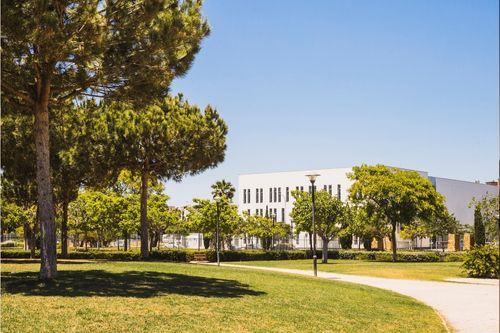Table of Contents
About Niagara College Canada
Located in the heart of the Niagara Region, Niagara College (NC) is just minutes from one of the world’s most well-known tourist destinations and offers over 130 innovative programs across two state-of-the-art campuses in Welland and Niagara-on-the-Lake.
Its campuses offer one-of-a-kind laboratories and first-rate facilities that provide hands-on applied learning opportunities, world-class research, and smaller class sizes in an intimate and welcoming environment.
NC, Canada’s applied, experiential learning leader, provides its students with diverse programs that reflect and respond to the region’s key sectors, province, and global economy.
In these programs, students are immersed in a highly experiential learning environment enhanced by digital technologies. NC graduates have cultural and global competencies. The students are innovative, adaptable, and entrepreneurial, pushing worldwide boundaries.
History
Ontario established its college system on May 21, 1965, paving the way for colleges of applied arts and technology. In response to the provincial initiative to establish many such institutions, Niagara College’s Welland Campus was established in 1967, offering career-oriented diploma and certificate courses.
Niagara College’s Niagara-on-the-Lake Campus opened in 1998 in Niagara-on-the-Lake, Ontario. The hospitality, tourism, and culinary programs at Niagara College relocated from the Maid of the Mist Campus to new facilities at the Niagara-on-the-Lake Campus in 2004. ThisCollege opened the Niagara College Teaching Winery in 2002, the first commercial teaching winery in Canada. Niagara College Teaching Brewery in 2011, also the first of its kind in Canada.
Niagara College’s Canadian Food and Wine Institute now includes culinary programs, a teaching winery, and a teaching brewery. The Black Swamp, which Laura Secord traveled through to warn British Lieutenant FitzGibbon of a surprise attack by American forces, was located on the Niagara-on-the-Lake campus in the early nineteenth century.
The college established the Tourism Industry Development Centre (TIDC) in response to the rapid growth of Niagara’s tourism sector and the anticipated demand for thousands of new workers. The TIDC, located on the Maid of the Mist Campus in Niagara Falls, is a dedicated industry development and training resource for the hospitality and tourism sectors. The addition of the Ontario Street Site in 2007 was useful for accommodating the growing Health & Community Studies programs.
As part of the college’s overall master plan, Niagara College began a campus redevelopment in 2008, which included significant improvements and additions to the Welland and Niagara-on-the-Lake campuses. The redevelopment project increased capacity in programs serving key Niagara industries, such as skilled trades, technology, winery and viticulture, hospitality, and tourism, while improving aging facilities. The project was also in response to the college’s expansion.
This included a 10.1 percent increase in total enrolment for the fall 2008 term, the highest increase among all Ontario colleges. The Welland Campus underwent construction that included a 15,000-square-foot (1,400 m2) expansion to the Rankin Technology Center, a new Academic Wing, a Library and Learning Commons, a two-story Athletics Center, a Student Center, and the $40 million Applied Health Institute (AHI), which the federal and provincial governments funded through the Knowledge Infrastructure Program (KIP).
The facility consolidates Niagara College’s health programs into a single complex, making room for new programs and 1,000 new students. Classrooms and simulation labs, a dental clinic, a community health clinic, and a 350-seat auditorium are all part of the AHI.
Campus

There are four active campuses of the college. They are as follows
Welland campus of Niagara college
This campus has a variety of services and activities available, such as a fitness and sports center, a student activity center, open computer labs, a campus store, a library, and a cafeteria. Broadcasting, acting for film and television, communications, health and community studies, early childhood education, and policing are all offered on the Welland Campus. The Technology Skill Centre as well as the Centre for Policing and Community Safety Studies, are new additions to this campus. This is a result of a collaboration between the college and the Niagara Regional Police Service. The Welland Campus houses all the technology programs in one location. The Welland campus is a true ‘community’ campus, as it also houses the new Welland YMCA and the Niagara Children’s Safety Village.
Daniel J. Patterson campus
The Daniel J. Patterson Campus (previously known as the Niagara-On-The-Lake Campus and before that as the Glendale Campus) was established in 1998 and is located at Glendale Avenue and Queen Elizabeth Way. The three-story educational facility is located at the base of the Niagara Escarpment, a World Biosphere Reserve. It includes a greenhouse center, the new Niagara Waters Spa, the Niagara Culinary Institute, its 100-seat dining room, and the Niagara College Teaching Winery. Students cultivate plants of many varieties year-round in more than 1,850 m2 (20,000 sq ft.) of greenhouse space, living labs, container and field nursery operations, and onsite greenhouse equipment. These plants are sold to the public and used to beautify the 68-acre (280,000 m2) Campus.
Toronto School of Management Partnership campus
As part of the Global University Systems (GUS) group, Niagara College Canada and the Toronto School of Management partnered in February 2021 to offer Niagara College’s most sought-after programs at TSoM’s campus in the city of Toronto, Ontario.
Niagara College Toronto is housed in the Education House Toronto. It features 35,000 square feet of newly renovated classrooms, computer labs, a state-of-the-art auditorium, a student lounge, a student-run café, a library, and other amenities.
The Toronto School of Management runs it as part of a Public College Private Partnership (PCPP) agreement with Niagara College Canada of Applied Arts and Technology.
Taif campus of Niagara college
The college is establishing a ‘national center of excellence’ in tourism, hospitality, and business innovation in the Kingdom of Saudi Arabia. Male Saudi citizens can pursue programs such as business and management studies, culinary studies and hospitality. The foundation year studies program’s design prepares the students for success by teaching them English communication, entrepreneurship, and computer skills.
Courses

The college focuses on advanced technology, English as second language instruction, food, and wine sciences, and applied health and community safety. Food, wine, horticulture, and aesthetics are all important aspects of learning at Niagara College.
Common programs at Niagara college
Undergraduate Diploma
- Business – General (2 years)
- Business – Accounting (2 years)
- Business – Sales and Marketing (2 years)
- Computer Programming (2 years)
- Business – General (TSoM Pathway) (2 years)
Graduate Certificate
Hospitality and Tourism Management (1 Year)
Human Resources Management (1 Year)
International Business Management (1 Year)
Rankings of Niagara college
Niagara University ranks 33 in Regional Universities North in the Best Colleges 2022-2023 edition.
Other rankings
- Best Colleges for Veterans (tie)- 14
- Best Value Schools- 5
- Top Performers on Social Mobility (tie)- 68
- Nursing (tie)- 293
Alumni
Notable alumni of Niagara College
- Photographer Edward Burtynsky
- Politician Shirley Coppen
- Sportscaster Dan Dunleavy
- Politician Christel Haeck
- Politician Peter Kormos
- Journalist Bernie McNamee.
Key takeaways
- Niagara College is a leading institute in applied education and one of Canada’s most entrepreneurial colleges. Its mission is to enrich lives and fulfill dreams by providing students with a world-class education.
- NC has four campuses- The Welland, Daniel J Patterson, Toronto School of Management Partnership, and Taif. Its campuses offer one-of-a-kind laboratories and first-rate facilities that provide hands-on applied learning opportunities.
- Niagara college primarily focuses is on advanced technology, English as second language instruction, food and wine sciences, and applied health and community safety.
Did you find this blog informative? If so, please share your thoughts in the comments section below. Click here to contact us for more information on Niagara College. We would be happy to assist you with your queries.
Liked this blog? Read next: The University of Washington | Rankings, admission, student life
FAQs
Q1. Does Niagara College provide a work permit?
Ans– All Niagara College post-secondary programs (except EAP) available to international students are eligible for a PGWP.
Q2. What is the acceptance rate for Niagara College?
Ans- Admission to Niagara University is very selective in its admission process, with a 92% acceptance rate.
Q3. Does Niagara College ask for an IELTS score?
Ans- Niagara College accepts the IELTS Academic tests. The IELTS General tests are not accepted for academic program admission.







